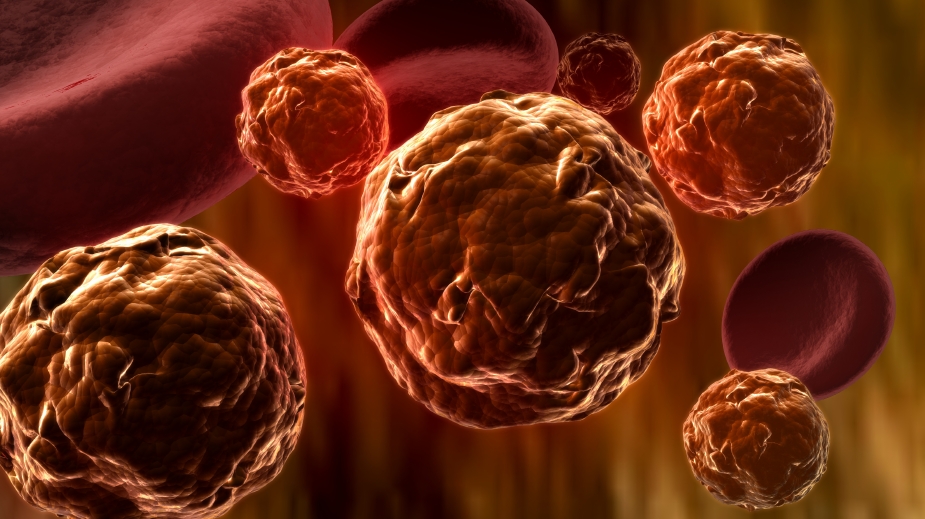Psoriasis Cause & Treatment

Viral cells can interfere with the
immune system causing psoriasis
There are many factors that may contribute to the cause of psoriasis. Many psoriasis researchers believe that a biochemical stimulus may act as a trigger promoting abnormally high skin growth, which will in turn cause the skin lesions (National Psoriasis Foundation). Heredity also plays a role in the development of psoriasis. Individuals who have a family member with a severe case of psoriasis tend to experience early onset of the disease. Researchers have isolated 9 gene mutations that may be involved in the occurrence of psoriasis. One of these mutations on chromosome 6, called PSORS-1, have been identified as a major factor in the cause of this condition. Mutations on genes cause certain cells to function differently. With psoriasis, these mutations seem to largely affect T-helper cells. Recent research studies indicate that psoriasis may be a disorder of the immune system. When the immune system is functioning normally, the T cell, a white blood cell, normally works to fight off infection and disease. Scientists believe that having an abnormal immune system may cause abnormal activity by T cells in the skin. These abnormally active T cells cause skin inflammation and increased cell production. These T-cells "attack" the skin and set off a cascade of events that make the skin cells multiply so fast they start to stack up on the surface of the skin. Normal skin cells form, mature, and then are sloughed off every 30 days. But in plaque psoriasis the skin goes through this whole process in 3-6 days.
Not everyone who has these gene mutations gets psoriasis. Lifestyle factors have also been found to play a role in causing psoriasis in people who have these gene mutations.
Other psoriasis trigger factors include:

Psoriasis may be the result of a gluten
allergy to flour made from grains and oats
Diet and vitamin influences are thought to play a role in psoriasis development and progression (Kligman 729). The immune system may trigger psoriasis rashes as a result of foods or medications taken internally. Many processed foods, vitamins and medications contain gluten. It is believed that as much as 5% to 10% of the population may suffer from some form of gluten intolerance. This intolerance often displays itself in the form of psoriasis rashes, plaques, and red irritated skin.
Injury to the skin can cause the formation of a psoriasis patch known as the Koebner Phenomenon, and it can occur in other skin diseases, such as eczema and lichen planus. It can take 2 to 6 weeks for the symptoms of Koebner Phenomenon to develop after an injury. Types of injuries that can trigger a flare include: Abrasion - even mild abrasion, Increased friction from clothing or skin rubbing against skin in folds, such as armpits or under breasts, Sunburn, Viral rashes and rashes resulting from a reaction to medication. In order to prevent an injury from becoming a Koebnerised flare, it is important for patients to avoid skin injuries and begin treatment for rashes as quickly as possible. If caught early enough, treatment is possible, and preventative treatment can be started if a skin injury occurs.
Weather is a strong factor in triggering the symptoms of psoriasis. Exposure to direct sunlight, which usually occurs in the warmer months, often improves the rash. On the other hand, cold, short days seen in the winter months can trigger the rash to worsen.
Stress plays a major role in contributing to the symptoms of all skin conditions. Stress can trigger a psoriasis flares, but scientists are still unclear about exactly how this occurs. Studies do show that not only can a sudden, stressful event trigger a rash, daily hassles of life can also trigger the symptoms to flare or worsen.
Infections caused by bacteria or viruses can cause a psoriasis flare. Streptococcal infections that cause tonsillitis, or strep throat, tooth abscesses, cellulitis, and impetigo can cause the symptoms of guttate psoriasis in children. The human immunodeficiency virus (HIV) does not increase the frequency of psoriasis, but it does increase the severity of the disease.
Low levels of calcium have been reported as a trigger for psoriasis. Oddly enough, even though medications made from vitamin D are used in the treatment of psoriasis, low levels of vitamin D do not trigger a flare-up.
The degree of psoriasis can also vary from individual to individual. The symptoms range in severity from mild (affects less than 2% of body) to moderate (affects 2-10% of body) to severe (affects greater than 10% of the body).
Psoriasis Symptoms:
Psoriasis patients may have one or more of the following symptoms of itching, cracking, stinging or burning. The psoriasis symptoms also vary based on the type of psoriasis, but may include one or more of the following conditions:
- Chronic flaky patches that crack and bleed on the palms of the hands and the soles of the feet.
- Red lesions covered with white scales, while they can appear anywhere on the body, the most commonly affected areas are the scalp, knees and elbows.
- Small, drop-shaped red patches of psoriasis, which often appears on the trunk, arms and legs. Smooth inflamed lesions in skin folds in the groin, under the breast, and armpits. Typically, it appears as smooth inflamed lesions without scaling and is particularly subject to irritation due to rubbing and sweating.
- Scaly red skin over all the body.
- A large red area containing pustules. The most common type of pustular psoriasis affects the palms and soles.
- Psoriasis accompanied by arthritis. Psoriatic arthritis generally affects the fingers and toes, but it can involve the wrists, lower back, knees and ankles.
- Red, scaly patches that are sometimes lumpy on the scalp or ears.
- Pits in the nails of various size, shape, and depth. Sometimes the nails develop a yellowish color and become thick.
New skin cells take about a month or so to move from the deepest skin layer where they're produced, to the surface where they die and flake off. With psoriasis, the entire skin cell life cycle takes only days leading to an accumulation on the skin surface causing symptoms including irritation, itching and redness.
People with psoriasis may notice that there are times when their symptoms worsen, then improve. Conditions that may trigger flare-ups include changes in climate, infections, stress, and dry skin. Also, certain medicines, most notably beta-blockers, which are used in the treatment of high blood pressure, and lithium or drugs used in the treatment of depression, may trigger or cause an outbreak or worsening of the disease.
Purchase Psoriasis-Ltd III For Treatment:
Because psoriasis is a lifelong condition, the levels of its severity and improvement can fluctuate over time. At Psoriasis-Ltd we strive to help you find new methods of treatment to extend the time between outbreaks and lessen the symptoms and severity of the symptoms when you do have an occurrence.
The treatment of psoriasis is based on a combination of the sufferer's age, the severity of their psoriasis, the area of the body affected by psoriasis, and the type of psoriasis they have. Psoriasis tends to flare-up when the person is exposed to certain trigger factors. Substances or conditions that can worsen psoriasis include changes in climate, infections, stress, and dry skin. Controlling these conditions can in itself be a form of treatment. Certain medicines used to treat psoriasis may cause an outbreak or worsening of the disease. Start your treatment journey toward clearer skin and a more carefree lifestyle.

